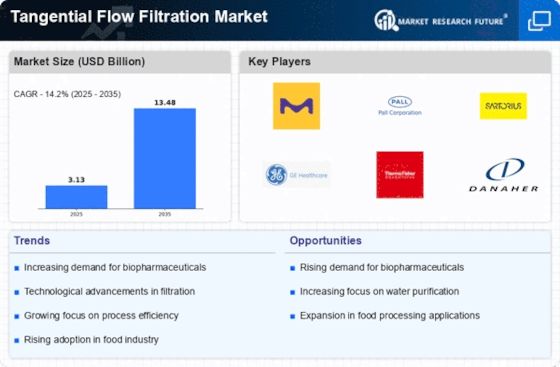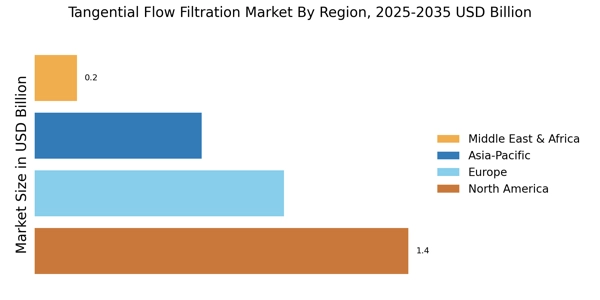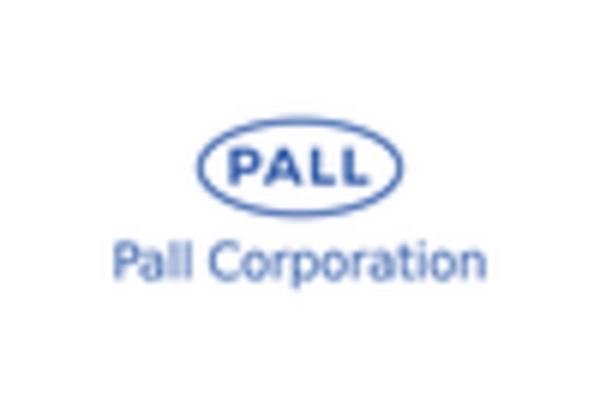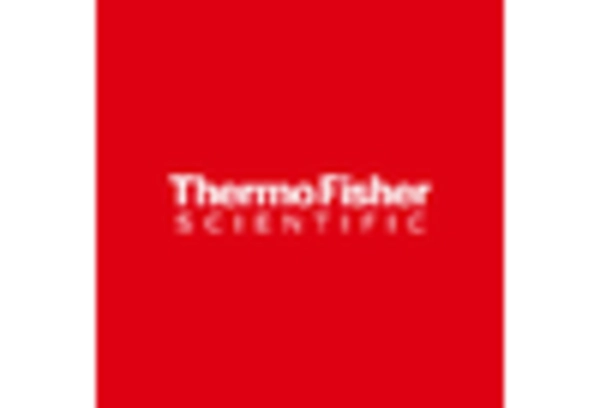Growing Regulatory Requirements
The stringent regulatory landscape governing the pharmaceutical and biotechnology industries is a significant driver for the Tangential Flow Filtration Market. Regulatory bodies are imposing more rigorous standards for product purity and safety, necessitating the adoption of advanced filtration technologies. TFF systems are recognized for their ability to meet these stringent requirements, providing reliable and reproducible results. As companies strive to comply with regulations, the demand for TFF solutions is expected to rise. The market is projected to grow at a rate of 8% annually, driven by the need for compliance with evolving regulatory frameworks. This trend underscores the importance of TFF in ensuring that biopharmaceutical products meet the necessary quality standards.
Advancements in Membrane Technology
Technological advancements in membrane materials and designs are significantly influencing the Tangential Flow Filtration Market. Innovations such as the development of high-performance membranes with enhanced selectivity and fouling resistance are improving the efficiency of TFF systems. These advancements allow for better separation of biomolecules, which is essential in applications such as protein purification and cell harvesting. The market for advanced membrane technologies is expected to grow at a CAGR of 10% over the next five years, indicating a robust demand for TFF solutions that leverage these innovations. As membrane technology continues to evolve, the Tangential Flow Filtration Market is likely to benefit from increased adoption across various applications.
Rising Demand for Biopharmaceuticals
The increasing demand for biopharmaceuticals is a primary driver of the Tangential Flow Filtration Market. As the biopharmaceutical sector expands, the need for efficient purification processes becomes critical. Tangential flow filtration (TFF) offers advantages such as higher product yield and reduced processing time, making it an attractive option for manufacturers. According to industry reports, the biopharmaceutical market is projected to reach USD 500 billion by 2026, which suggests a corresponding growth in the TFF market as companies seek to optimize their production processes. This trend indicates that the Tangential Flow Filtration Market is likely to experience significant growth as biopharmaceutical companies increasingly adopt TFF technologies to meet regulatory standards and enhance product quality.
Increased Focus on Process Efficiency
The emphasis on process efficiency within the pharmaceutical and biotechnology sectors is driving the Tangential Flow Filtration Market. Companies are continually seeking methods to streamline operations and reduce costs. TFF systems are known for their ability to operate continuously, which minimizes downtime and maximizes throughput. This efficiency is particularly beneficial in large-scale production environments, where time and resource management are crucial. Market analysis indicates that the adoption of TFF systems can lead to a 30% reduction in processing time compared to traditional filtration methods. As organizations strive for operational excellence, the Tangential Flow Filtration Market is poised for growth as more companies integrate TFF into their manufacturing processes.
Sustainability and Environmental Considerations
The increasing emphasis on sustainability and environmental responsibility is shaping the Tangential Flow Filtration Market. Companies are under pressure to adopt greener practices, and TFF systems are often seen as a more sustainable alternative to traditional filtration methods. TFF reduces waste generation and energy consumption, aligning with the goals of many organizations to minimize their environmental footprint. Furthermore, the ability of TFF to operate with lower volumes of solvents and reagents contributes to its appeal in environmentally conscious manufacturing processes. As sustainability becomes a priority for the industry, the Tangential Flow Filtration Market is likely to see a rise in demand for TFF solutions that support eco-friendly practices.

















